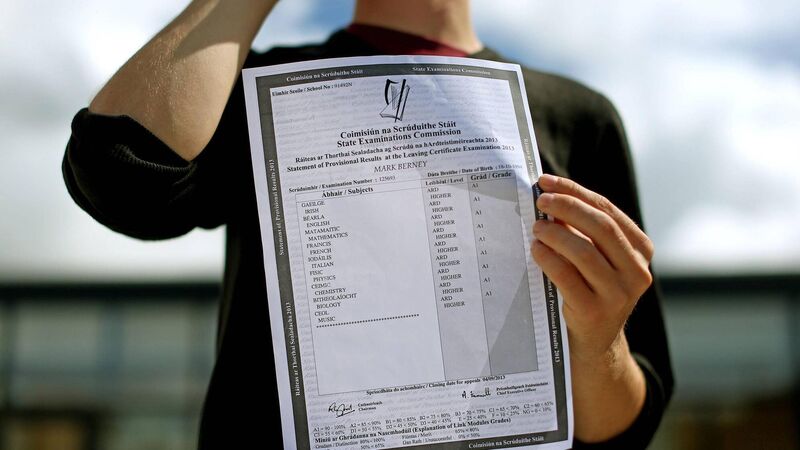Concerns that deferred students may lose out due to record high leaving cert grades

A total of 25.9% of Leaving Certificate grades awarded at higher level were a H1 or a H2,
Labour Education spokesperson Aodhán Ó Ríordáin has warned that the government may need to ensure further college places are added to cope with increased grades and the impact of this on students who deferred last years offers.
Deputy Ó Ríordáin is calling on Minister for Education, Norma Foley and Minister for Further and Higher Education, Simon Harris, to "ensure that all efforts are made so that students from 2019 aren’t punished by increase in grades this year."
“While 1,250 extra places have been created in high demand courses, more may be needed, and in what is hopefully a once off for this year, the government should act to fund more places if there is a requirement to ensure deferred students don’t lose out," he added.
Six students at a secondary school in Cork have received at least 625 points each, with two of these students receiving eight H1 grades.
Christian Brothers Boy's Secondary School, a fee-paying school on Wellington Road, said it is thrilled with its students' results.
Meanwhile, a former head girl at a Meath post-primary school was 'thrilled' this morning to receive 601 points - a score that should secure her place at Dublin's Trinity College to study engineering with management.
The results however were bitter sweet for Laura Brady from Gibbstown, Navan who almost feels cheated that she missed out on sitting the exams and proving her worth.
This morning, thousands of students across the country received their calculated grades online.
Speaking on Morning Ireland on RTÉ Radio One, Minister Norma Foley acknowledged that not every student will be happy, "I have every confidence that students will be happy as they can be on the day of CAO offers coming out and I acknowledge there will be students who will be less happy, as there is for every leaving certificate."
Leaving Certificate students have received a record number of CAO points this year as calculated grades see results soar across the board, with results up at every level.
With more students opting for higher level this year, more than one in four (25.9%) of grades awarded at this level was a H1 or a H2, which carries a minimum of 88 points.
Almost 9% of these grades were H1s, which carry a minimum of 100 points. This compares to an average of 5.6% of grades across 2017, 2018, and 2019. At ordinary level, the number of top marks also increased by 1.7%, from an average of 1.5% between 2017 to 2019 to 3.2% in 2020.
Overall, grade inflation across all subjects at all levels stands at 4.4% according to the Department of Education. It is not yet known what this will mean for the first round of college offers this Friday.
Entry points in any given year can fluctuate, based on a course’s popularity, and this year there are many factors that could affect the CAO process. This includes the number of students who may opt to defer their place.
Additional places have been created to help ease pressure in the points race for high-demand courses such as teaching and medicine. However, the Irish Universities Association (IUA) said while grade inflation is "understandable" given the exceptional circumstances, it is aware of the challenges it may pose CAO applicants presenting results from previous years.
"We understand the position these applicants now find themselves in, and are actively working with Government to endeavour to find a whole-of-system response to this," it said.
Institutes of technology will also be working closely on ensuring "fairness and equity".
Approximately 10,000 CAO applicants this year are due to present Leaving Certificate results from 2019. While the 2020 grades are higher than in previous years, school-based estimates were reduced considerably by the standardisation process. One in five of these estimates was changed, with the majority of these downgraded.
According to the department, it received “strong evidence” that many teachers tended to estimate their grades “over-optimistically”. The extent of this varied between schools.
The department placed a priority on fairness rather than eliminating “excessively” high results. Results this year would have been more accurate, and more in line with previous years, if a school’s track record in the Leaving Certificate exams had been kept as a factor in its calculations.
This much-maligned element of "school-based-data" was removed from the equation last week. However, it is believed that keeping this part of the process would have run the risk of undermining public confidence in calculated grades.
Before standardisation, 13.4% of higher-level grades were H1s. This compares to 5.8% in 2019. If left unchecked, these increases would have put the CAO process under even more severe pressure, it is believed.
Gender, socioeconomic background, school status, and other demographic categories were not included in the statistical model used in the calculated grades process. However, these characteristics were checked as part of the validation process.
A further 2,500 calculated grades were not issued to students as the department did not deem it possible, it confirmed.
This applied to students studying an extra subject outside of school, or in the case of students studying for their Leaving Certificate independently of any formal educational involvement.
In a message to students, Norma Foley, the Minister for Education acknowledged that results day 2020 is very different to the day students had anticipated, planned, and dreamed of.
“I do appreciate what an especially difficult time you have had over the past six months, and I want to commend you for the patience, courage, and resilience you have shown in that time," she said.
Guidance Counsellor Gemma Lawlor is urging students who have an exemption from Irish or a second language to make sure it has been applied properly when they get their results, "Students need to ensure that the exemption has been acknowledged by the NUI."
"The minimum entry requirements are the same for courses and that is something to make sure you have done, for example, if you have an exemption from Irish make sure it has been ratified."





